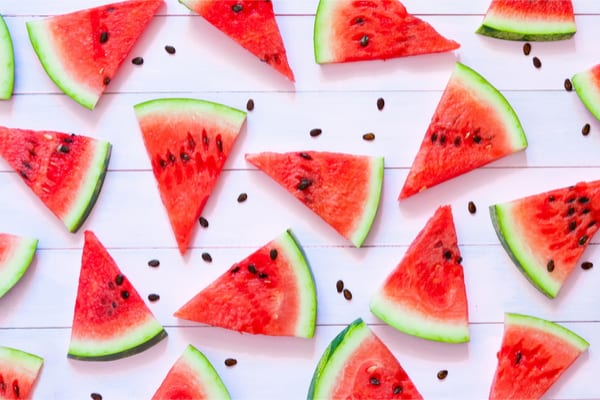When you were a kid eating watermelon on a hot summer’s day, did your parents ever tell you to spit out the seeds because a melon would grow out of your ears or stomach? In fact, the lowly watermelon seed has become so reviled that “seedless watermelons” have become the standard in most grocery stores. Well, everyone was wrong, wrong, wrong to pass along that old wive’s tale, because it turns out that those seeds might just be a superfood.
A one-ounce serving of dried watermelon seeds has 160 calories, 8 grams of protein, 13 grams of mostly unsaturated fat, phytochemicals and flavonoids, plus minerals like iron, magnesium, phosphorus, potassium and zinc. These little miracle seeds have been studied and touted as beneficial for everything from obesity and arthritis to diabetes and the immune system. Watermelon seed tinctures are promoted as a remedy for urinary infections, kidney function, improving skin, and reducing fevers, although though there’s no scientific evidence to support such claims.
People in Africa, Asia, and the Middle East are one up on us here in the West, since they have been cultivating watermelon seeds – which, as it turns out, have a pleasant, nutty flavor – for eons, roasting them as a snack, grinding them into flour to make bread, mashing them into a pulp to thicken soup, and even using the seed oil in cooking and frying. Now the western hemisphere is scrambling to play catchup, with the watermelon seeds market exploding due to the increased popularity of veganism, protein-rich foods and that eternal quest for the next big “superfood.”
While chewing watermelon seeds straight from the melon may not be super appetizing because of the hard and bitter seed coat, you can find packaged roasted watermelon seeds in many snack aisles these days. But wait, there’s more. You can also find watermelon seed butters (which you can spread on bread or crackers as you would a nut butter), watermelon seed powders (that you can mix into a smoothie for flavor and for extra protein, though most Americans already get enough protein in their diet) and Go Raw sells a protein bar that contains sprouted watermelon seeds.
If you don’t want to spend money on packaged watermelon seeds, you can roast them yourself: Use the hard, mature dark seeds, not the undeveloped white ones. After rinsing in a colander, allow them to dry thoroughly. Heat vegetable oil (such as canola, olive, or sesame) in a wok or skillet and add the seeds, stirring them frequently until they’re brown. When they’re almost done, add a sprinkling of salt if you want. After they cool, you can crack them in your mouth as you would a sunflower seed and eat the inside. An alternative method is to spread the seeds on a baking sheet—optionally with a drizzle of oil and a sprinkle of salt—and bake for about 15 to 20 minutes at 325°F or until they start to smell toasty.
So, snack away for health and for fun. But if the melon starts sprouting out of you orifices, don’t say grandma didn’t warn ya.
—
Photo Credit: All for you friend / Shutterstock.com
